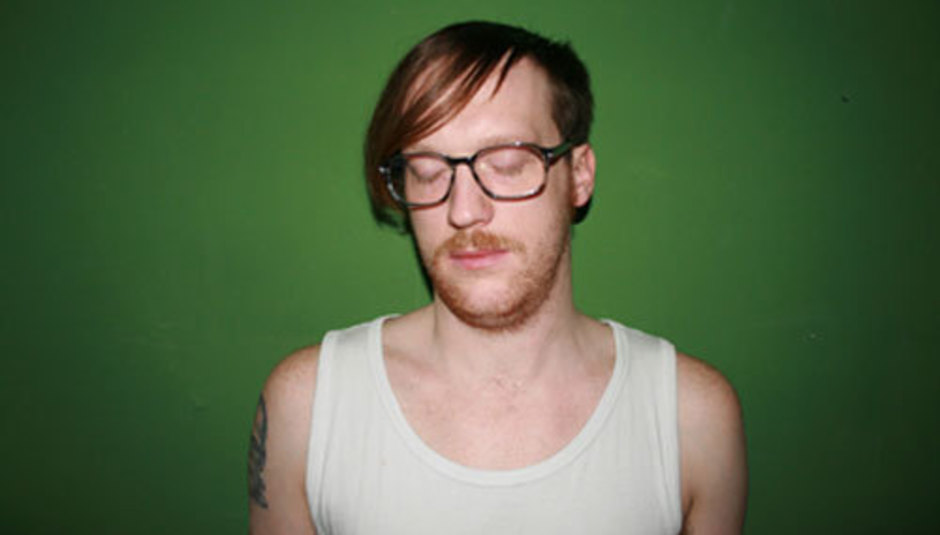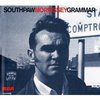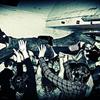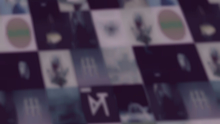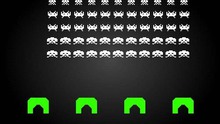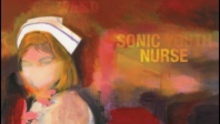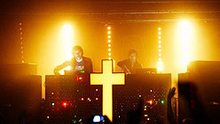Finally, two years after his stunning debut LP From Here We Go Sublime won the love of dance music aficionados and indie fans alike, the follow-up from Swedish producer The Field (aka Axel Willner) is finally upon us.
Yesterday and Today explores the same richly melodic, relentlessly looped territory as its forerunner. The method has changed, however, with live instrumentation featuring on all the tracks in contrast to FHWGS's laptop-dominated construction.
Suppressing our spluttering excitement, DiS chatted over a dodgy phone line to Herr Willner in his new home of Berlin about expectations, musical freedom, collaborating with John Battles Stanier, illegal downloading, Krautrock and love...
DiS: The most noticeable change between From Here We Go Sublime and Yesterday and Today is the prevalence of live instrumentation on the new album. What were your reasons for this shift?
AW: When I was touring From Here We Go Sublime I got pretty weary of standing there with a laptop and some effects. I didn't feel free to do what I wanted. I asked some of my friends to play with me and it felt much better to leave the computer behind and use a sampler instead. Everything now is much more free in a jam-style of way. The shows vary depending on our mood. It's more open.
DiS: More organic?
AW: Yeah, big time. we don't start playing punk rock or anything, but it's much more open.
DiS: Did you feel conscious of the fact that a guy standing behind his laptop is kind of boring to look at?
AW: Well, that's been the whole discussion since the laptop scene started, and it feels pretty nice to have moved away from it and not have to hear anyone saying, "Oh, is he checking his email?" It's also pretty nice for people to see that it's a physical show, and to see what we do. It's another thing if you go to listen to a DJ. Then you don't really care about what he's doing, just whether the music's good and you can dance. But at a live show, I guess you want to see that something's actually going on.
DiS: Yesterday and Today's title track was co-written with drummer John Stanier [from Battles]. How did that collaboration come about?
AW: We met a few times in the course of playing around the world. One time we were both in Cologne at the same time - at Cologne Pop last summer - and we just thought, why not go and play some music and jam for a little while? So we did. We just recorded a sketch with pretty bad sound, but out of that sketch we eventually made the song that's on the album.
DiS: Did you have to trade files back and forth rather than recording the song together in the studio?
AW: Yeah, it had to be that way. It was me in Berlin and Stockholm and John in Cologne. He recorded the drums, then I got them and arranged them.
DiS: Did you find the success and critical adulation heaped on From Here We Go Sublime intimidating in any way?
AW: Yeah, of course.
DiS: How do you deal with that, and the heightened expectations surrounding the release of Yesterday and Today?
Well, it was strange while we were still touring FHWGS, because I didn't have the time to really sit down and make music. When I started making music again I didn't reflect on what people might think about it. I'm doing that now, in this period between people knowing the album is ready but it not having been released. So at this point, I'm a little bit intimidated.
DiS: That must be the strangest time, when you're no longer preoccupied with writing and recording the thing, yet most people haven't heard it.
AW: Yeah, and it's pretty hard to sit and wait. You're going to be judged, Some people will not like it, some people will like it more, someone new will hear it, and so on. But it's something I try not to think about too much [laughs]. We'll see what happens.
DiS: Although it's in keeping with the sound familiar to fans of FHWGS, Yesterday and Today seems like a more complex album in a lot of ways. Is that how you see it?
AW: Yeah, and I think that's got a lot to do with there being so much live instrumentation on it.
DiS: Despite the live instrumentation, do you still begin the whole process with a sample?
AW: Yes, I still start with samples, and still use the same old program that I’ve been using for years now [the Finnish tracker program Buzz]. I'm still using that for the whole pre-production style, and then the arrangements and the additions with the live instrumentation were made in a small house outside Stockholm where we spent a week and recorded all this stuff.
DiS: If you have a musical idea when you're away from your computer or not in the studio, do you make any attempt to capture it?
AW: Well, mostly the whole thing starts with my hearing a song or melody or sound that I like and want to re-work. I have to come to the studio to work on it, because when I make music I have to make it pretty much in the moment. I'm not a guy who sits in the studio and tries that hard if I don't have the feeling, if you know what I mean. And also I have to be done with it in one go. I don't go back and remix stuff. But then I had to with the live instrumentation this time around, of course, which was a new experience. But very fun. We'll see what happens when I start to make new stuff again, if I will go back to working as I always did before.
DiS: Despite there being a lot going on in your music, there's also an element of the music that's very minimal, in a sense. Does that kind of aesthetic appeal to you?
AW: Yeah, but not in terms of creating it myself. I'm too interested in harmonies and melodies to make minimal music. I would get bored, I think. I love to put layers on layers, so if I was to make super-minimal stuff - a kick and some percussion and maybe a delay - that wouldn't work at all for me.
DiS: Do you think that aversion has something to do with your coming from a traditional musical background, as opposed to having always made music with computers?
AW: Yes, it's true. Even though I love minimal things – not especially minimal techno, but really minimal music like Pan Sonic and all that stuff - I never really tried to make it. I don't think I have that in me at all.
DiS: Are titles important to you, or the last thing you think about?
AW: They're not the last thing I worry about at all, but at the same time the title isn't super-important. A track will of course mean something to me and the title is a reflection of that, but it won't necessarily mean the same thing to someone else.
DiS: You've got to be happy about coming up with one as good as 'I Have The Moon, You Have The Internet', though. What's the story behind it?
AW: Ah, that was someting between me and my girlfriend. I was on this little island outside Stockholm where we were recording and she was in Berlin. There was pretty bad reception but a beautiful sky and moon. It's about the two of us missing each other but being glad that we could talk.
DiS: How did the cover of The Korgis' 'Everybody's Got To Learn Sometime' come about?
AW: We were on the island and after a long day of recording we were having dinner and sitting and talking and listening to some music. This came on the playlist and I like it very, very much, so we decided to just play it when we finished eating. We played it on an electric piano and chopped up some loops. So it was really a drunken decision that turned out really well.
DiS: Your remix of 120 Days' 'Come Closer' became a blogosphere sensation back in 2006. Would you characterise the internet as having a positive or negative effect on music?
AW: I don't know. The internet offers a way to reach the whole world, and if you're like me if you enjoy something you'll still want to have it on vinyl; you're not satisfied if you don't have it. But most people in the world are not like me, and they don't want to go and buy the vinyl, which makes it hard to make a living out of music. I can't understand really how you can be satisfied with just having an mp3. The quality of the sound is so shitty. But a lot of people don't really care, and they don't want to spend money on music anymore because it's free. How can you persuade them or talk them into buying it? Especially the generation who grew up with this. For me it was vinyl or a cassette you had to buy, but now it's totally different. I don’t really pay so much attention to illegal downloading anymore because the whole discussion's getting kind of boring. Nothing new is happening and people will keep on doing it.
DiS: I noticed that a lot of people who don't usually listen to instrumental electronic music got into FHWGS. Did that surprise you?
AW: Yeah, I was surprised by that. And Friendly Fires sampled The Field! They used 'Sun & Ice' on 'Paris'! For me it's good because I listen to everything, and I would never want only to listen to one type of music and be cursing the rest. It's good that so many different people from different camps like it. It's honouring in a way, too, that you can appeal to people of different tastes.
DiS: What prompted your relocation from Stockholm to Berlin?
AW: Only love, actually. My girlfriend lives here. Because of what I do it was an easy decision to make. I've always like Berlin for many reasons, from a historical point of view and in terms of the music scene, too. It's a beautiful city.
DiS: I think I've heard you say before that you're not that into clubbing, though. I assume you're not at Berghain every weekend.
AW: No. I like to go there when I play rather than to be there as a visitor. You have to be in the mood. It's a fucking outstanding club, really.
DiS: Outstanding and a little terrifying sometimes...
AW: It is. You really have to have your mind set on going for it, otherwise it can be pretty intense.
The closing track on the new album, 'Sequenced', has a very Krautrocky, kosmische feel to it. Is it intended as a homage?
AW: Yeah, and it has no computer in it, even. It's just drum machine, bass, drums and keyboards. It's very kosmische even in how it's created.
DiS: Why have you called this album Yesterday and Today?
AW: The album's a reflection of how things are for me now, in a way, both musically and personally. Things changed between FHWGS and now. It's also a homage to Yes, who made a song called 'Yesterday and Today', too.
DiS: You're a fan of Yes?
AW: Yeah, some of it, of course. Yes, Vangelis, all that.
DiS: Yesterday and Today continues with the minimal look of all your releases as The Field. Is that your handwriting on the cover?
AW: Yeah. Back in the day I had a CD-R label and just made some cardboard CD cases that I'd write the artist and title on. When I first sent a demo to Kompakt it looked like this, and they liked it so we kept it. Some people think it's the most boring artwork in the world, but that doesn't matter.
Yesterday and Today will be released on Kompakt on 18th May 2009.

